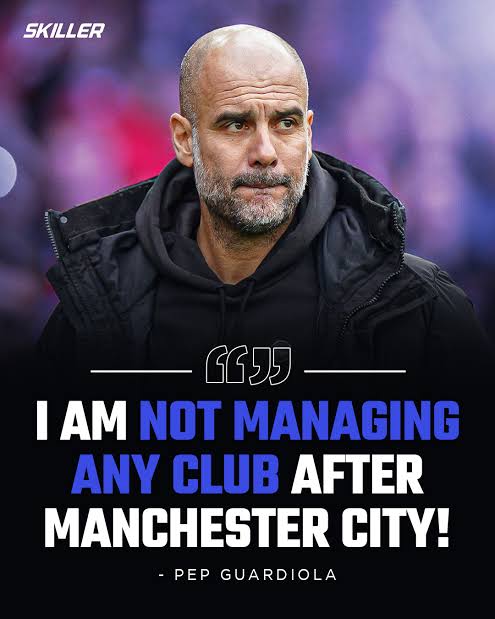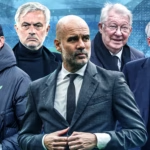Pep Guardiola’s International Ambitions: The Road to Brazil and Beyond

In a landscape where managerial legacies are defined not just by club achievements but by international conquests, Pep Guardiola’s career trajectory appears to be moving toward its final, potentially defining chapter. The Manchester City manager, whose tactical innovations have revolutionized club football across Europe, has made it increasingly clear that his ultimate ambition lies in the international arena—specifically, in leading a national team to World Cup or European Championship glory.
The Brazilian Connection: Ancelotti’s Shadow Looms Large
Despite persistent rumors linking him with the Brazilian national team, Guardiola’s path to the Seleção appears temporarily blocked, as Carlo Ancelotti reportedly stands poised to take the reins in a blockbuster deal that would see the Italian coach depart Real Madrid in June. This development represents a significant twist in what has been a long-standing courtship between Brazilian football authorities and the Catalan tactician.
“I would like to train a national team for a World Cup or a European Championship. I would like that,” Guardiola stated earlier this year, making no secret of his international aspirations. His comments followed reports from The Athletic in November that Brazil had included him on their shortlist to replace then-coach Dorival Junior, who was eventually dismissed in March.
However, Guardiola’s decision to extend his Manchester City contract until 2027, signed in November, effectively removed him from immediate contention for the Brazilian job. This timing, coupled with Brazil’s urgent need for stable leadership ahead of the 2026 World Cup qualifiers, appears to have pushed the five-time world champions toward Ancelotti, a coach for whom Guardiola has repeatedly expressed deep admiration.
“I will never consider that Carlo Ancelotti is a bad coach tactically,” Guardiola remarked before their Champions League clash earlier this season. “See where he put [Andrea] Pirlo in Milan, how he uses [Toni] Kroos, and the position of [Jude] Bellingham. In Manchester, we consider him to be a great coach, in everything.”
The mutual respect between these two managerial titans extends beyond tactical appreciation. “Exceptional person, we have a good relationship,” Guardiola told TNT Sports. “We don’t see each other much. He’s more experienced, a little older! He’s been in many leagues with success. How he makes teams work, all the success [shows] how good he is.”
The City Chapter: A Definitive End in Sight
What makes Guardiola’s international ambitions particularly significant is his unequivocal statement that Manchester City will be his final club managerial position. During a challenging period last December, when City secured just one win in nine matches and speculation about his future intensified, Guardiola made a definitive declaration to celebrity chef Dani Garcia on his YouTube channel.
“I’m not going to manage another team,” Guardiola affirmed. “I’m not talking about the long-term future, but what I’m not going to do is leave Manchester City, go to another country, and do the same thing as now. I wouldn’t have the energy. The thought of starting somewhere else, all the process of training and so on. No, no, no. Maybe a national team, but that’s different. I want to leave it and go and play golf, but I can’t [if I take a club job]. I think stopping would do me good.”
This statement represents perhaps the clearest indication yet that Guardiola views his time at Manchester City as the final chapter of his club management career. Having transformed Barcelona, Bayern Munich, and now City with his distinctive possession-based philosophy, the 54-year-old appears to see the national team environment as his next and potentially final frontier.
The England Connection: What Might Have Been
Intriguingly, Guardiola was approached last summer regarding the possibility of succeeding Gareth Southgate as England manager. While he ultimately signed a fresh two-year contract with City instead, this revelation demonstrates the broad appeal Guardiola holds for national associations worldwide. Few coaches can claim to have been seriously considered by both Brazil and England, traditionally the two most scrutinized and pressure-laden managerial positions in international football.
The England approach raises fascinating questions about what might have been, particularly given Guardiola’s extensive familiarity with English football and its players after his prolonged stint in the Premier League. His deep understanding of the English game—coupled with his proven ability to elevate English talents like Phil Foden, John Stones, and Kyle Walker to world-class levels—would have made him an intriguing candidate for the Three Lions.
The International Appeal: Why National Teams Attract Guardiola
The question of why Guardiola, a coach who has thrived on the day-to-day intensity of club management, finds the international stage so appealing merits deeper examination. For a tactician whose methods rely heavily on continuous training sessions and painstaking attention to detail, the sporadic nature of international gatherings might seem ill-suited to his strengths.
Several factors likely contribute to this attraction. First, the reduced physical and emotional toll of international management compared to the relentless club season offers Guardiola the opportunity to extend his coaching career while maintaining a healthier work-life balance. His comment about wanting to “leave it and go and play golf” suggests a desire to step back from the all-consuming nature of club management.
Second, the challenge of winning either the World Cup or European Championship represents the only major frontier Guardiola has yet to conquer in his illustrious career. Having dominated domestic competitions across Spain, Germany, and England, and claimed multiple Champions League titles, international success stands as the final jewel in his coaching crown.
Third, the project of molding a national team—working with a fixed pool of players rather than pursuing transfers—presents a distinctive challenge that might appeal to Guardiola’s problem-solving sensibilities. The constraints of international management, far from being limitations, could stimulate his tactical creativity in new ways.
The Brazilian Dream: Why the Seleção Appeals
Despite reports of Ancelotti’s imminent appointment, Brazil remains the most logical destination for Guardiola when his City contract expires in 2027. Several factors make this potential union particularly compelling.
Brazil’s rich footballing heritage and tradition of expressive, technical play align naturally with Guardiola’s footballing philosophy. The Seleção’s historical emphasis on ball possession, individual skill, and attacking flair mirrors many of the principles Guardiola has championed throughout his managerial career. The marriage of Brazilian talent with Guardiolan structure could produce a formidable combination.
Furthermore, the timing could prove perfect. Should Ancelotti lead Brazil through the 2026 World Cup cycle as reported, his departure would coincide neatly with the conclusion of Guardiola’s City contract in 2027. This would position Guardiola ideally to take over the Brazilian national team ahead of the 2030 World Cup, giving him a full tournament cycle to implement his ideas.
Brazil’s talent pool remains among the world’s most impressive, with a new generation of players emerging to complement established stars. The opportunity to work with such a rich array of technical ability would surely appeal to a coach who has always prioritized skill and intelligence in his players.
The Legacy Question: What International Success Would Mean
For Guardiola, international success would answer the few remaining critics who point to his reliance on club resources and financial backing. Leading a national team to glory would demonstrate his ability to succeed within the constraints of a fixed player pool and limited preparation time—a fundamentally different challenge from club management.
Success with Brazil, in particular, would elevate Guardiola into a truly rarefied category of coaches who have made indelible marks across different footballing cultures. From Catalonia to Bavaria to Manchester and potentially to South America, his influence would span continents and contexts in a manner few coaches can claim.
The historical significance would be profound. Brazil, despite its unparalleled record of five World Cup triumphs, has experienced a relative drought in recent decades, with its last global triumph coming in 2002. A Guardiola-led revival would carry immense symbolism, potentially marrying Brazilian expressiveness with European structural sophistication.
Guardiola’s Tactical Evolution: Preparing for the International Stage
Throughout his managerial career, Guardiola has demonstrated remarkable adaptability, evolving his tactical approach to suit different leagues, players, and challenges. This capacity for evolution will be crucial if he transitions to international management, where preparation time is limited and tactical implementation must be streamlined.
At Barcelona, Guardiola’s tiki-taka approach maximized the club’s exceptional technical talent. At Bayern Munich, he introduced greater vertical directness and positional flexibility. At Manchester City, he has further refined his approach, incorporating inverted full-backs, fluid positional exchanges, and varied attacking structures.
This continuous evolution suggests Guardiola is well-prepared for the challenges of international coaching, where pragmatism must sometimes temper idealism. His Manchester City teams, in particular, have demonstrated an increasing tactical flexibility that would serve him well at the international level.
The Competition: Other Potential Suitors
While Brazil appears the most natural fit for Guardiola’s international ambitions, several other national teams might vie for his services when his City contract expires in 2027.
Spain, his home nation, would represent a sentimental choice, offering Guardiola the chance to lead the country where his playing and coaching philosophy was initially formed. His intimate knowledge of Spanish football and close relationships with many Spanish players would facilitate a smooth transition.
Argentina, fresh from their 2022 World Cup triumph, could present an intriguing alternative. The opportunity to work with Lionel Messi—assuming the great Argentine extends his international career—might prove tempting for Guardiola, who oversaw Messi’s development into the world’s preeminent player at Barcelona.
Portugal, with its impressive generation of technical talent, could also emerge as a dark horse candidate. The Portuguese style of play, emphasizing technical quality and intelligent possession, aligns naturally with Guardiola’s approach, and the country’s relatively modest recent tournament record offers room for significant achievement.
The Timing Question: When Might the Move Happen?
With Guardiola contracted to Manchester City until 2027 and Ancelotti reportedly set to lead Brazil until after the 2026 World Cup, the timeline for any potential move appears clearly defined. Guardiola would be 56 years old when his City contract expires—relatively young by modern coaching standards but having already accumulated over two decades of high-intensity managerial experience.
This timeline would position Guardiola to potentially lead a national team through the 2030 World Cup cycle, possibly culminating his coaching career on the game’s grandest stage. The 2030 tournament carries particular symbolic weight, marking the centenary of the inaugural World Cup in Uruguay.
Should Brazil indeed be Guardiola’s destination, the timing would allow him to inherit a team shaped by Ancelotti’s influence—potentially a more structured, tactically sophisticated Brazil than in previous eras. This foundation could prove ideal for Guardiola to implement his ideas without requiring a complete cultural revolution.
The City Legacy: What Remains to Be Done
Before any international aspirations can be realized, Guardiola must complete his Manchester City project. Having already delivered unprecedented domestic success, including an historic treble in the 2022-23 season, his remaining ambitions at the Etihad likely center on further European achievement.
Despite breakthrough Champions League success in the 2022-23 campaign, City’s European journey has sometimes fallen short of their domestic dominance. Establishing a period of European pre-eminence—perhaps with multiple Champions League triumphs—would represent the final frontier of Guardiola’s club career.
Additionally, nurturing the next generation of City talent and ensuring a smooth succession plan will be crucial to Guardiola’s legacy. His work in developing players like Phil Foden and Rico Lewis indicates his commitment to leaving City with a sustainable future beyond his tenure.
The Personal Dimension: Guardiola’s Mindset
Throughout his career, Guardiola has been candid about the psychological toll of high-level management. His sabbatical year between Barcelona and Bayern Munich demonstrated his awareness of burnout risk, and his comments about lacking “the energy” for another club job suggest similar considerations inform his current thinking.
International management, with its different rhythm and reduced day-to-day pressures, might represent an ideal compromise—allowing Guardiola to remain involved in elite coaching while reclaiming elements of personal life that club management inevitably sacrifices.
His mention of golf—a passion he shares with many football figures seeking respite from the game’s pressures—hints at a desire for balance that has sometimes proved elusive during his intensive club career. International management could provide the perfect platform for Guardiola to pursue his competitive ambitions while maintaining space for personal renewal.
The Ancelotti Factor: Learning from a Rival’s Journey
Carlo Ancelotti’s reported move to Brazil may provide Guardiola with valuable insights for his own potential international future. Ancelotti, at 64, is embarking on his international journey after an unprecedented club career that has included four Champions League triumphs across three different clubs.
Ancelotti’s adaptation to international football—his successes, challenges, and tactical adjustments—will offer Guardiola a case study in how an elite club coach can transfer his methods to the national team environment. Few coaches share Guardiola’s and Ancelotti’s experience of managing at the very highest level across multiple top European leagues, making Ancelotti’s Brazilian experiment particularly relevant.
Guardiola’s evident respect for Ancelotti suggests he will watch this transition with interest. Their contrasting styles—Ancelotti’s adaptable pragmatism versus Guardiola’s more defined philosophical approach—make the comparison especially instructive.
Conclusion: The Final Chapter Awaits
As Pep Guardiola navigates the final years of his Manchester City tenure, the outline of his career’s concluding chapter appears increasingly defined. Having revolutionized club football across three countries and established himself among the sport’s greatest ever coaches, the international stage beckons as his final frontier.
While Carlo Ancelotti’s reported appointment as Brazil manager temporarily blocks one potential path, the timing of Guardiola’s City contract expiration in 2027 aligns perfectly with the conclusion of a World Cup cycle. This convergence creates the conditions for Guardiola to potentially lead Brazil—or another major nation—into the 2030 World Cup.
For a coach who has consistently sought new challenges throughout his career, international management represents the logical final step—an opportunity to test his methods in a different context and pursue the one major honor that has eluded him. Whether with Brazil, Spain, or another footballing power, Guardiola’s international chapter promises to be as fascinating as all that has come before.
The door to Brazil may be temporarily closed, but for a coach of Guardiola’s caliber, patience is justified. As his Manchester City contract ticks toward its 2027 conclusion, football’s international stage prepares for the arrival of its most influential modern tactician—a development that could reshape the balance of power in the global game for years to come.















